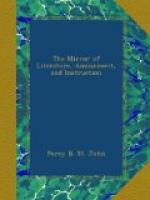On the road, we passed within view of “the Briars,” where the chief resided during the building of Longwood; and where he,
“Whose game was kingdoms, and whose
stakes were thrones!
His table earth, his dice were human bones!”
played at whist with the owner, Mr. Balcombe, for sugar-plums!
* * * * *
ANECDOTE GALLERY.
* * * * *
OUR ANECDOTAGE.
(From the New Monthly Magazine.)
Daniel De Foe said there was only this difference between the fates of Charles the First, and his son James the Second; that the former’s was a wet martyrdom and the other’s a dry one. When Sir Richard Steele was made a Member of the Commons it was expected from his ingenious writings that he would have been an admirable orator, but it not proving so, De Foe said “He had better have continued the Spectator than the Tatler.”
The local designation of the following anecdote confirms its authenticity, which however required no other indication than the characteristic humour of Addison in his odd conception of old Montaigne.
When Mr. Addison lodged in Kensington Square, he read over some of “Montaigne’s Essays,” and finding little or no information in the chapters of what their titles promised, he closed the book more confused than satisfied.
“What think you of this famous French author?” said a gentleman present.
“Think!” said he, smiling. “Why that a pair of manacles, or a stone doublet would probably have been of some service to that author’s infirmity.”
“Would you imprison a man for singularity in writing?”
“Why let me tell you,” replied Addison, “if he had been a horse he would have been pounded for straying, and why he ought to be more favoured because he is a man, I cannot understand.”
A medical confession, frankly delivered by that eminent physician and wit, Sir Samuel Garth, has been fortunately preserved; perhaps the truth it reveals is as conspicuous as its humour.
Dr. Garth (so he is called in the manuscript) who was one of the Kit-Kat Club, coming there one night, declared he must soon begone, having many patients to attend; but some good wine being produced he forgot them. When Sir Richard Steele reminded him of his appointments, Garth immediately pulled out his list, which amounted to fifteen—and said, “It’s no great matter whether I see them to-night or not, for nine of them have such bad constitutions, that all the physicians in the world can’t save them, and the other six have so good constitutions that all the physicians in the world can’t kill them.”




